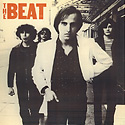
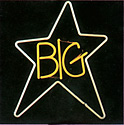
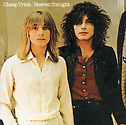
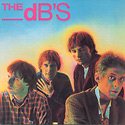
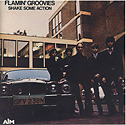
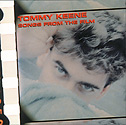
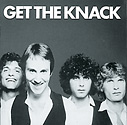
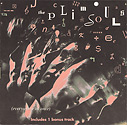
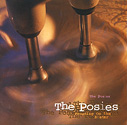
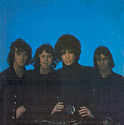
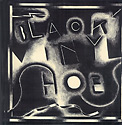

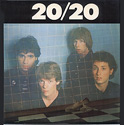
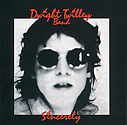
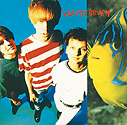
THE BEAT The Beat (Columbia/CBS), 1979
After warming the drummer’s seat in the Nerves, Paul Collins led the Beat through its debut, a dream synthesis of eight important records: the first four each by the Ramones and Cheap Trick. Plus, it has an adolescent let’s-dry-hump-in-the-rec-room, big (but not dumb) rock feel to it. Centerpiece “Don’t Wait Up For Me” is usually mentioned when people discuss the very best ‘70s power pop, which isn’t advisable unless you’re into arguments and tears.
BIG STAR #1 Record (Ardent), 1972
“In The Street” (a.k.a. “That ‘70s Song”) may now be lodged in TV Land’s unconscious as an anthem for suburban myopia, but the whole of Big Star’s debut is a study in weird ambition. Nobody expected—or even wanted—Alex Chilton and Chris Bell to build a bridge between soul-gritty Memphis and poncey-pop London, but they did it anyway. Tough and beautiful, #1 Record is the sonic equivalent of a girl lipsticking a cigarette and pouting at an imperfect world.
CHEAP TRICK Heaven Tonight (Epic), 1978
Before Robin Zander’s At Budokan introduction evolved into a Beastie Boys sample, “Surrender” served notice that these heartland heavies had arrived. The song stands as the band’s finest moment, putting the lie to any notions of hipness (the singer’s parents get their kicks smoking sess and rocking his Kiss albums) while sporting a hook that could land Moby Dick. Heaven Tonight forged the hair-metal template by welding glam-rock chops to straightforward pop.
THE dB’S Stands For deciBels (Albion), 1981
The sound of high-school angst bundled up and shipped off to college. Amid brainy variations on the boy-lusts-after-girl theme, Peter Holsapple’s buoyant jangle-garage collides improbably with Chris Stamey’s funkier psychedelic musings, making for the perfect tension-based songwriting partnership. As bolstered by adventurous production detail, the sonic house of cards wobbles but never topples. Import-only at the time, deciBels became a nexus of insiderdom cool in the ‘80s.
FLAMIN’ GROOVIES Shake Some Action (Sire), 1976
When guitarist Cyril Jordan assumed command of the Groovies and dumped their Stonesy pout, they became an altar for his heroes, fusing Phil Spector’s “wall of sound” density, Byrds-like mega-jangle and Fab Four melodic sense. Shake was intended as burnt offering, but its buzzing, 12-string-soaked originals—Jordan’s inflammatory guitar sparking Chris Wilson’s tinder-dry vocals like a match to kindling—stands up alongside anything created by their idols.
TOMMY KEENE Songs From The Film (Geffen), 1986
Though Keene generally disavows the power-pop tag, he’s a melodic god to bands ranging from the Goo Goo Dolls to Velvet Crush. Songs is the biggest reason why. Keene’s sizzling guitar playing, sharp, wistful lyrics (recurring themes: loss, backstabbing, carnivals) and a re-recorded version of “Places That Are Gone” cement the album’s landmark status. The indignity of Songs’ lackluster chart performance was compounded when the 1998 CD re-release quickly went out of print.
THE KNACK Get The Knack (Capitol), 1979
Critics may have launched a campaign to “Knuke The Knack,” but make no mistake: The little girls understood. This L.A. band’s coming-out party went gold in a mere 13 days, converting more than five million devotees along the way and making it one of the most successful debuts ever. It’s an overtly sexist, insanely catchy run through the new-wave jungle, highlighted by the invincible “My Sharona” and the Penthouse Letters-inspired “Good Girls Don’t.”
THE PLIMSOULS Everywhere At Once (Geffen), 1983
Former Nerves hipster Peter Case fronted this gritty L.A. combo with one foot in the nocturnal badlands of garage punk and the other in the jingle-jangle morning dew of folk rock. Placement of “A Million Miles Away” in the punk puppy-love flick Valley Girl—and the band’s multi-ethnic personnel—raised hopes that the Plimsouls had the tools to tunnel out from the genre’s college-kid/urban-bohemian musical ghetto into the bright sunlight of mass appeal. No such luck.
THE POSIES Frosting On The Beater (DGC), 1993
With producer Don Fleming (Sonic Youth, Hole, Screaming Trees) applying a layer of rocked-up grime to the Posies’ pristine pop, the group’s third LP finds it adrift in the sea of grunge that flooded Seattle during the early ‘90s. But the added toughness does the band a measure of good. The Posies’ once-precious songs turn ferocious (“Dream All Day” and “Solar Sister” particularly benefit from the sonic shagginess), at last achieving harmonic balance on the power/pop scales.
RASPBERRIES Raspberries (Capitol), 1972
This debut is generally regarded as the first fully formed, start-to-finish American example of the genre. The popular Beatles comparisons are overstated; this sounds like 1972, the year it and Big Star’s #1 Record would unknowingly birth the most venerable, unchanged and frustrating style in all of rock ‘n’ roll history. At the nose of Raspberries is “Go All The Way,” a song about Eric Carmen’s white suit lying crumpled next to your 16-year-old daughter’s bed
SHOES Black Vinyl Shoes (Black Vinyl), 1977
Frequently mischaracterized as Shoes’ lo-fi debut album (that would be 1975’s vinyl-only Un Dans Versailles), this contains all the mythic trappings of obscurity surrounding its creation. Recorded to four-track in Jeff and John Murphy’s Zion, Ill., living room and originally intended as a demo, Black Vinyl Shoes captures the magic of Shoes at their best (sparkling melodies, pitch-perfect harmonies) and sounds even fresher today than it did during the Carter administration.
MATTHEW SWEET Girlfriend (Zoo), 1991
Often thought of as his first album (two substandard earlier LPs deservedly stiffed), Girlfriend saw Sweet come seemingly out of nowhere to establish himself as a new-school melody wizard. A smart, tuneful song cycle featuring achingly catchy tracks like “I’ve Been Waiting” and “I Wanted To Tell You,” Girlfriend is a signpost of ‘90s power pop and offered a brief, if ultimately futile, glimmer of hope that this kind of music might make a dent in the marketplace.
20/20 20/20 (Portrait), 1979
The hormonal heatwave of a high-school dance. Girls. Piloting your convertible, top down for effect, with the radio up full blast, doing 65 in a 35. Girls. Breathless late-night phone calls professing undying devotion—at least until the next crush comes along. Girls. Guitar riffs that reflexively make you grab a nearby tennis racket, resplendent in the glory of rock poses staring back from the bedroom mirror. A girl named Cheri. Weird simultaneous references to the Creator and “Yellow Pills.” Girls.
THE DWIGHT TWILLEY BAND Sincerely (The Right), 1976
Twilley’s debut has it all: intricate stealth ballads, note-perfect Zombies/Beatles and Elvis/Jerry Lee pastiches, widescreen Sam Phillips-meets-Phil Spector production. And it sizzles with lust and aches with longing while rocking like a mofo—has there ever been a more exhilarating slab of throbbing sonic Tantrism than “I’m On Fire”?—in stark contrast to the sexless, so-bored bleatings of punk, a category into which Sincerely was inaccurately lumped at the time.
VELVET CRUSH In The Presence Of Greatness (Ringers Lactate), 1991
Self-proclaimed greatness for a debut album? As Hall Of Fame pitcher Dizzy Dean once said, “If you can do it, it ain’t braggin’.” In The Presence Of Greatness sports a thoroughly homogenized mixdown that assigns equal weight to vocals and instruments. Poured from a bar’s Waring blender, the Crush’s teenage symphonies are sweet as pineapple juice with a guitar aftershock like 120-proof vodka—overwhelming evidence to all still upright that these guys certainly could “do it.”







7 replies on “Absolute Power: MAGNET’s Top 15 American Power-Pop Albums”
I had a lot of these on Vinyl at one time.
Some of the albums I might go for alternatives. It seems that most of these bands made at least 2 really good albums. For example, the db’s “Like This”, Big Star’s Radio City, Knack’s But the Little Girls Understand etc.
A quibble perhaps, but one would seriously have to consider putting a Romantics record on here, and my personal list would absolutely have to include the first Jellyfish album, Lemonheads It’s a Shame about Ray, and Especially for you, from the Smithereens. I believe legend has it that EFY was one of two albums that Nirvana listened too repeatedly before they recorded Nevermind.
The great thing about lists like these, from someone who really knows the genre, is that it gives me a few new albums I’ll have to check out.
[…] If you’re new to The Posies’s music, come check out the album Magnet Magazine lists as their top 15 power pop albums of all-time. […]
This top 15 list is in the exact order that I’d rank these albums. It’s funny, I came across this article and thought to myself, the 1st album by The Paul Collins Beat should be at the top and sure enough, it is. Paul Collins had another band before The Beat called The Nerves, which he founded with Peter Case in 1974. The Nerves toured with The Ramones, but never released a full length LP album. Their EP was great and included the song hanging on the telephone, which has been run into the ground after being covered by Blondie, Cat Power and Def Leppard. So, we lost Doug Fieger of The Knack and Alex Chilton of Big Star and The Box Tops only weeks apart. I’m happy to say that Paul Collins is still alive and playing both with The Beat and with his solo alternative country solo project. Haven’t heard the country stuff yet. Collins has been outspoken about music piracy and file sharing and I admire him for looking for solutions rather than pointing the blame. The Paul Collins Beat recently had a comeback with several CD reissues of the old albums and their new albums are excellent too. Some of my favorites of the new material are the songs helen and big pop song. I saw them on one of the U.S. tours, a year or so ago, but haven’t heard the new album made by The White Stripes’ producer. Long live Paul Collins, long live The Beat.
Did somebody forget about The Rubinoos?
Elliott Smith effortlessly created pop masterpieces. This list seems biased towards 70s bands and dismissive of those that actually produced pop AND art.
The reason the list is biased toward 70s bands is because like it or not, the 70s is where the genre first asserted itself. These bands had an uphill climb. Remember what was dominant then: On one hand were blues-based long haired rock bands and the excessive artifice of the art rock scene, while much of pop music was, as usual, banal and forgettable adult contemporary mush. Even the nascent disco-pop was preferable to what rock and roll had become. This list, as any list, is just a starting point.
@George Mathis: As for Elliott Smith, I have no opinion on his music, and labels ultimately suck, but his sound is personal, melancholy, singer-songwriter stuff that’s does not contain the most basic elements of power pop. “I Wanna Be With You”, “Go All the Way”, “September Gurls”, “Cruel to be Kind”, “She Said She Said”, “Surrender” — these are songs that represent a type of art form in themselves. The notion that one can only be a capital-A “Artist” by continually expressing personal torment and avoiding popular appeal? Asinine.
The Smithereens, Especially For You…